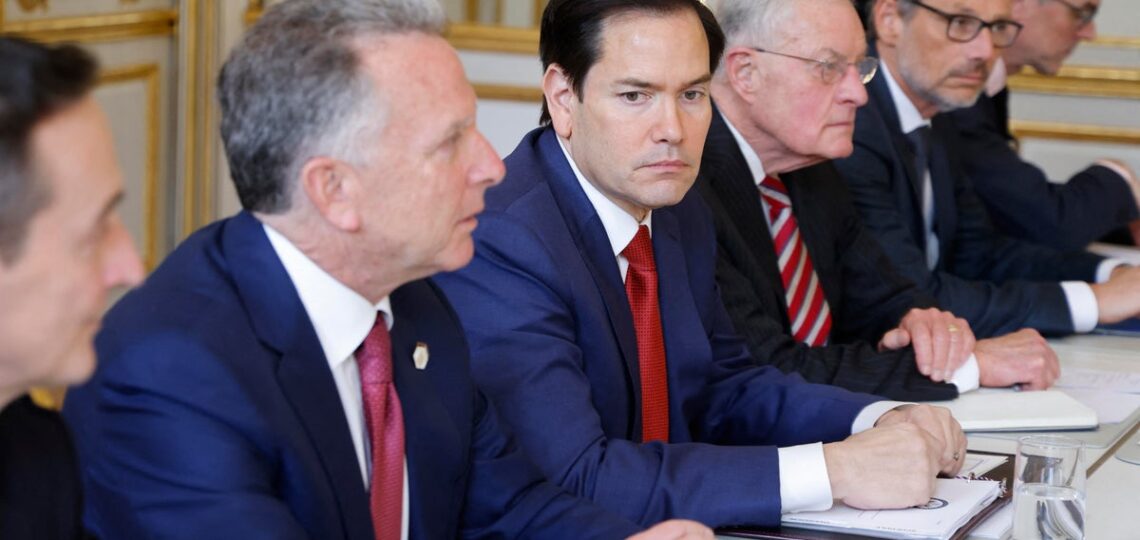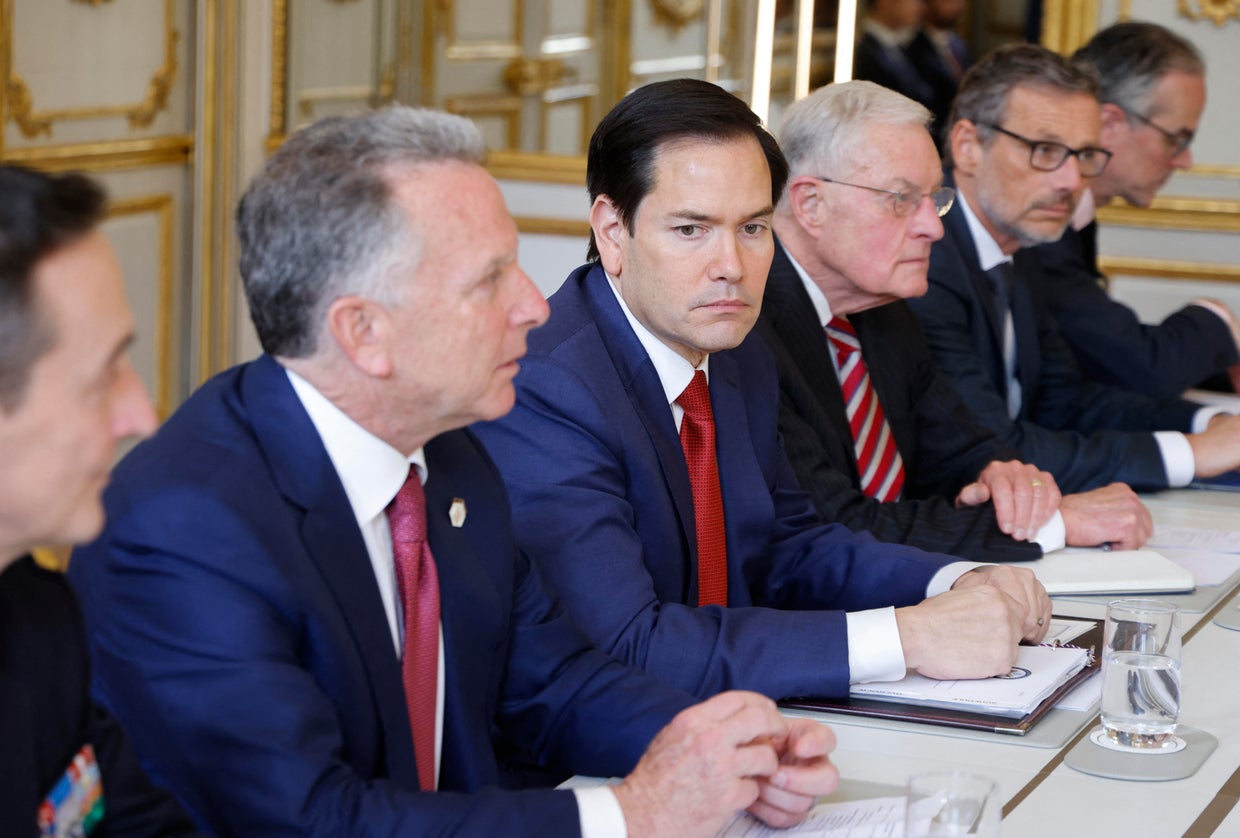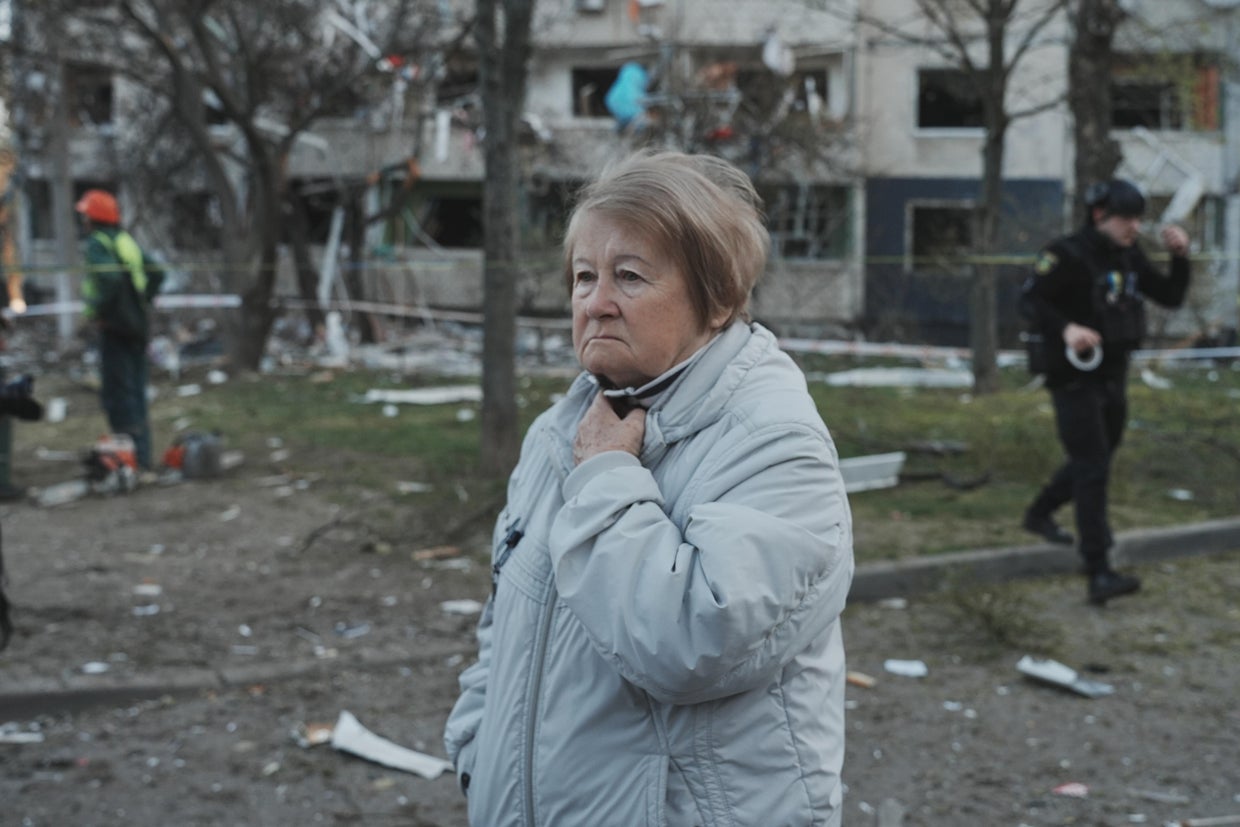
Rubio says Trump admin may soon “move on” from Ukraine-Russia peace efforts: “It’s not our war”
Paris — U.S. Secretary of State Marco Rubio said Friday that the U.S. may “move on” from trying to secure a Russia-Ukraine peace deal if there is no progress in the coming days. Months of efforts by the White House have failed to bring an end to the fighting, despite repeated promises by President Trump before he took office that he would use his skills as a negotiator to end the war immediately.
Rubio spoke in Paris after landmark talks among U.S., Ukrainian and European officials produced outlines for steps toward peace and appeared to make some long-awaited progress. A new meeting is expected next week in London, and Rubio suggested that could be decisive in determining whether the Trump administration continues its involvement.
“We are now reaching a point where we need to decide whether this is even possible or not,” Rubio told reporters upon departure. “Because if it’s not, then I think we’re just going to move on.”
“It’s not our war,” Rubio said. “We have other priorities to focus on.” He said the U.S. administration wants to decide “in a matter of days.”
His remarks contrasted starkly with the stance of the Biden administration, during which then-Secretary of State Antony Blinken warned not long after the war began that Russia’s autocratic President Vladimir Putin was determined “to reconstitute the Soviet empire. Short of that, he’d like to reassert a sphere of influence around neighboring countries that were once part of the Soviet bloc. And short of that, he’d like to make sure that all of these countries are somehow neutral.”
Ukrainian President Volodymyr Zelenskyy has also warned, including in multiple interviews with CBS News, that Putin is intent on expanding Russia’s borders by force — and breaking the security bonds forged among Western democracies during World War II, of which the U.S.-led NATO alliance has been the most tangible.
“For him, we are a satellite of Russian Federation. At the moment, it’s us, then Kazakhstan, then Baltic states, then Poland, then Germany. At least half of Germany,” Zelenskyy told CBS News’ Charlie D’Agata about one year ago. “This aggression, and Putin’s army, can come to Europe, and then the citizens of the United States, the soldiers of the United States, will have to protect Europe because they’re the NATO members.”
Zelenskyy called Russia’s invasion a war “against the democracy, against the values, against the whole world,” acknowledging even then that some in the West might be tired of hearing that message, “but only those are tired who are not at war, who don’t know what war is, and who have never lost his or her children.”
“If we do not stand firm, he will advance further,” Zelenskyy reiterated in an interview with 60 Minutes just this month. “It is not just idle speculation; the threat is real. Putin’s ultimate goal is to revive the Russian empire and reclaim territories currently under NATO protection. Considering all of this, I believe it could escalate into a world war.”
Trump says “we have a minerals deal” with Ukraine
Rubio’s comments on Friday came hours after the U.S. and Ukraine seemingly neared a long-delayed deal to grant U.S. access to Ukraine’s vast mineral resources, which has been intertwined with President Trump’s peace push.
“We have a minerals deal,” Mr. Trump said Thursday, and Ukraine’s economy minister said Friday that the two countries had signed a memorandum of intent ahead of a possible fuller agreement later.
The deal, which Ukrainian Economy Minister Yuliia Svyrydenko said she signed with U.S. Treasury Secretary Scott Bessent, is expected to pave the way for significant investments, infrastructure modernization and long-term cooperation.
Work toward the mineral deal had stalled in February following a contentious Oval Office meeting between Mr. Trump, Vice President JD Vance, and Ukrainian President Volodymyr Zelenskyy. Negotiations have since resumed.
Rubio on the dialogue with Russia, and Europe
Despite apparent growing U.S. impatience with the peace efforts, Rubio called Thursday’s Paris talks constructive. “Nobody rejected anything, nobody got up from the table or walked away.”
Rubio didn’t single out Russia or Ukraine as blocking peace efforts. He said he informed Russian Foreign Minister Sergey Lavrov about the outlines that emerged when they spoke after the Paris talks, but wouldn’t say how Lavrov reacted.
LUDOVIC MARIN/POOL/AFP/Getty
When asked about Rubio’s comments on Friday, Kremlin spokesman Dmitry Peskov told reporters that “fairly complex” negotiations were ongoing between Russia and the U.S. He did not give details but said no direct talks between Mr. Trump and Russian President Vladimir Putin were scheduled in the coming days.
“Russia is striving toward resolving this conflict, securing its own interests, and is open to dialogue. We are continuing to do this,” he said.
In its readout on the call with Rubio, the Kremlin said Lavrov had confirmed Moscow’s “readiness to continue working together with American colleagues to reliably eliminate the root causes of the Ukrainian crisis.”
Putin and his deputies have consistently claimed those root causes are Zelenskyy’s actions and NATO’s eastward expansion — misleading narratives that Mr. Trump himself has at times espoused about the full-scale invasion Putin launched on Feb. 24, 2022.
After weeks of tension with European allies, Rubio told reporters in Paris that the European negotiators proved helpful. “The U.K. and France and Germany can help us move the ball on this.”
During a meeting on Friday with Italian Prime Minister Giorgia Meloni in Rome, Vice President JD Vance also spoke about the ongoing negotiations with Ukraine and Russia, saying he wouldn’t “pre-judge them, but we feel optimistic that we can hopefully bring this war, this very brutal war to a close.”
European concerns are growing, however, about Mr. Trump’s readiness to draw closer to Russia. These talks were the first time since his inauguration that top American, Ukrainian and European officials met to discuss an end to the war, which has posed the biggest security challenge to Europe since World War II.
The meetings addressed hypothetical security guarantees for Ukraine in the future, but Rubio wouldn’t discuss any possible U.S. role in that. Some kind of U.S. support for Ukraine is seen as crucial to ensuring that Russia would not attack again if and when a peace deal is reached.
Rubio and presidential envoy Steve Witkoff have helped lead U.S. efforts to seek peace, and Witkoff has met three times with Putin, Rubio said. Several rounds of negotiations have been held in Saudi Arabia.
Moscow has effectively refused to accept a comprehensive ceasefire that Mr. Trump has pushed and Ukraine has endorsed. Russia has made it conditional on a halt in Ukraine’s mobilization efforts and Western arms supplies, which are demands rejected by Ukraine.
Deadly Russian strikes on Ukraine continue
Russia, meanwhile, has kept up a series of deadly strikes on Ukrainian cities, according to officials there, wounding scores of civilians days after missiles killed at least 34 during Palm Sunday celebrations in the northern city of Sumy.
One person died and 103 others, including eight children, were wounded as Russia hit Kharkiv, Ukraine’s second-largest city, early on Friday, its mayor Ihor Terekhov reported. He said cluster munitions struck a “densely populated” neighborhood four times.
Viktoriia Yakymenko/Suspilne Ukraine/JSC “UA:PBC”/Global Images Ukraine/Getty
Russian drones also targeted a bakery in Sumy, less than a week after the deadly Palm Sunday strike there, killing a customer and wounding an employee, the regional prosecutor’s office said. Photos released by the agency showed rows of Easter cakes stacked inside a devastated building, covered in thick dust, as a huge hole gaped in the wall behind them and rubble piled up on the floor.
Last Sunday’s strike on Sumy, resulting in mass casualties, was the second large-scale missile attack to claim civilian lives in just over a week. Some 20 people, including nine children, died on April 4 as missiles struck Zelenskyy’s hometown of Kryvyi Rih.

